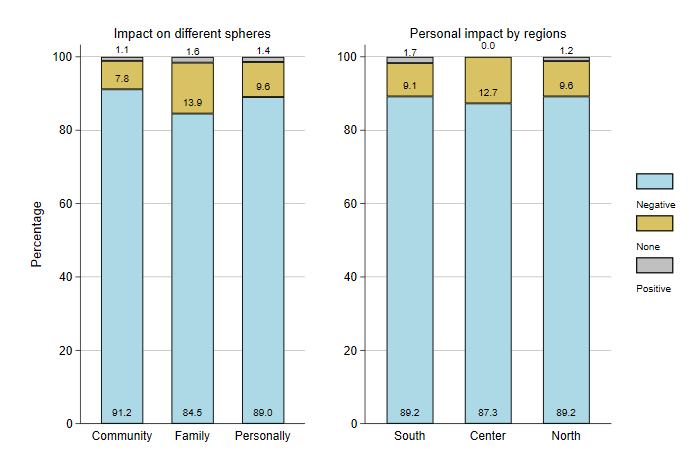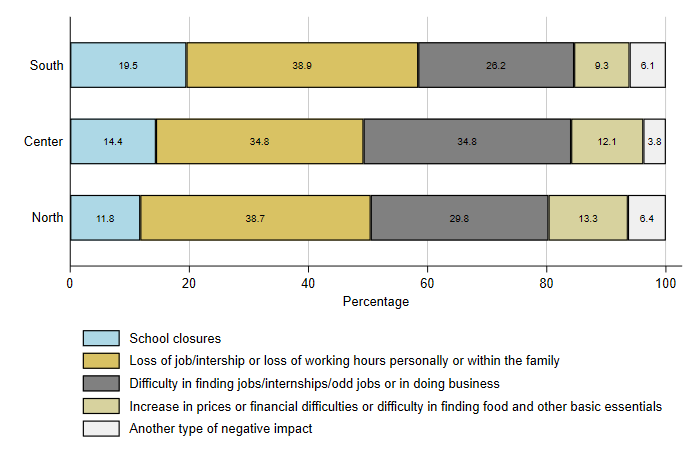Graduating in the shadow of the pandemic
Since appearing in 2019, the COVID-19 pandemic has plunged the world into an unprecedented health and socioeconomic crisis. In response, during the second half of March 2020, the government of Mozambique enacted several measures (in force until now) to guarantee social distancing, with the aim of breaking the transmission chain of the disease. There is speculation that this new reality is negatively impacting, in particular, young people in the Mozambican economy. But so far, concrete information on the effects of the pandemic on the well-being of this part of the population is sparse.
In this blog we present some indicators of COVID-19’s impact on the lives of graduating students from technical institutes in Mozambique, as they enter the labour market during the beginning of the pandemic, between April and June 2020, based on the preliminary results of a recent survey.
From October 2019, and until December 2020, the Inclusive growth in Mozambique programme is implementing a survey on the school-to-work transition of technical and vocational education graduates in Mozambique. Based on a sample of students from twenty technical schools in the provinces of Cabo Delgado, Nampula, Tete, Maputo City, and Maputo Province, the study has the participation of nearly 1,600 students.
We base our observations here on the results of the first and second follow-up rounds of this survey, the latter of which included questions on the impact of COVID-19 on the graduating students’ lives.
From the data collected, we highlight three main findings:
COVID-19 is having a significant and negative economic impact on students
Almost all of the young participants in our survey claim to have been negatively impacted by COVID-19, or claim that their families and communities have suffered negative impacts, regardless of the region where they live (Figure 1).
Figure 1: COVID-19 Impact

Note: The number of observations is n = 1,597 corresponding to the total of those who answered “if COVID-19 had any financial/economic impact”
School closures, job losses, reduced working hours, and difficulty finding a job were the changes with the greatest impact on students
Just over 30% of students reported the loss of a job or experienced a reduction in working hours due to COVID-19, and about 30% who were not employed revealed that difficulties in finding a job or an internship, or doing business, intensified (Figure 2). Students in the southern region were relatively more affected by the closure of schools, while those in the Centre and North had greater difficulty finding a job, internship, or informal work. This may indicate that, post-pandemic, students from the latter regions are more likely to enter the labour market after completing technical education, while students in the southern region are more likely to continue their studies.
Figure 2: Types of negative impact of COVID-19 by region

Note: The number of observations is n = 1.422, corresponding to the total of those who answered about “what type of financial / financial impact COVID-19 had personally”.
Employment deteriorated during the state of emergency
The COVID-19 emergency in Mozambique, and the policies to contain the pandemic in the country, will be having negative effects on the entry and retention of technical and vocational education graduates in the labour market.
Only 31% of the participants who were unemployed during the first follow-up had found a job by the second follow-up. For those who were already employed, the situation deteriorated significantly. A considerable percentage of participants employed in the first round (37%) transitioned to unemployment and 20% of them moved to more precarious forms of work, such as occasional or gig work. Participants hired by NGOs or the public sector have suffered lesser impacts, although these two sectors represent a very small portion (less than 10%) of those employed.
Four months on, what can we conclude?
The preliminary survey results show strong evidence of a negative and widespread economic impact of COVID-19 on the employment prospects of young Mozambicans during the first months of the pandemic. Although the informal sector serves as a refuge, it has proved to be insufficient, resulting in a high percentage of young people falling into unemployment. Some sectors, such as NGOs and the public sector, have been more resilient.
If graduating students in technical and vocational education already faced labour market challenges before COVID-19, these increased significantly during the beginning of the pandemic. The results indicate a need for continuous monitoring of the labour market by the competent authorities, especially for the impacts of COVID-19, and also the creation, urgently, of policy responses that strengthen the resilience of local companies to sustain employment prospects for young people.
Ivan Manhique and Gimelgo Xirinda are research assistants with the Inclusive growth in Mozambique programme and contributors to the Baseline survey on the school-to-work transition of technical and vocational education graduates in Mozambique.
The views expressed in this piece are those of the author(s), and do not necessarily reflect the views of the Institute or the United Nations University, nor the programme/project donors.



